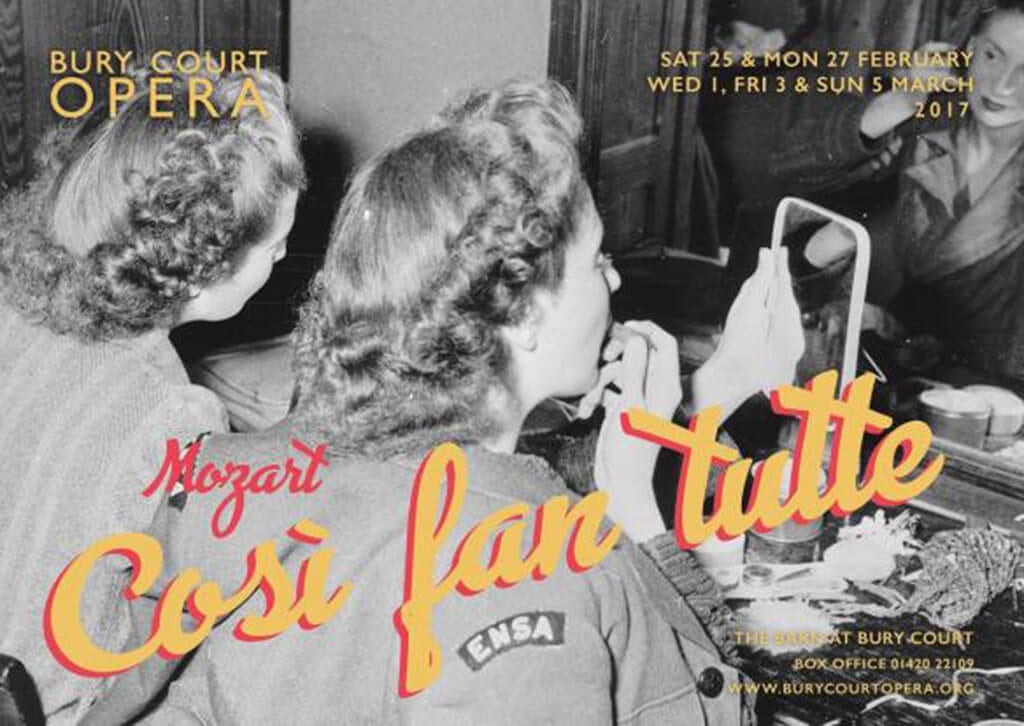Bury Court Opera is a delight. An hour from London on the train from Waterloo, the two week festival takes place in an ancient tithe barn converted into an auditorium that is almost ideal for small scale operas. Cosi fan Tutte absolutely fits the bill for this venue, though in this inventive production there is so much happening on stage, one sometimes forgets that we are not in a much bigger house. While some of the action is constrained by the lack of entrances on one side of the stage, the acoustic is wonderful and the Camerata Alma Viva under the baton of Paul Wingfield sound superb.
Director Daisy Evans provides a very radical reading of Cosi. The first scene gives us a stern and scarred Don Alfonso in military uniform, reading Robinson Jeffers’ poem “The Bloody Sire” which contains the line “Violence has been the sire of all the world’s values”. What follows is a very sceptical view about how passionate relationships can be distorted by war. The lessons learned in this ‘School for Lovers’ are anything but reassuring about the possibility that the two couples end the opera sadder and wiser.
The production is set in the Second World War and that works well. The two young men are soldiers and the two sisters are members of an ENSA troop that visits the camp where the men are stationed. The men disguise themselves as American airmen – Despina sings the original Italian libretto “Are they Turkish or Wallachian” but the surtitles translate this as “Are they American or Canadian”. They are certainly “oversexed, overpaid and over here” and the production contains plenty of visual and musical jokes that are funny but also entirely relevant to the story the production is telling. And that story ends with a denouement which is genuinely shocking – not a reading of the opera that I liked but it is impossible to deny the power and commitment of this version.
The production is well served by a fine cast of singers. Eddie Wade plays Don Alfonso as anything but the fatherly puppet master – he is sinister rather than genial and his powerful baritone delivers this uncomfortable reading of the role with style and force. Alex Otterburn in the baritone role of Guglielmo swaggers his way through the all-too-easy seduction of Dorabella and tenor David Shaw as Ferrando – after singing his famous un’aura amorosa aria quite beautifully – reacts in a disturbing way to the resistance of Fiordiligi to his charms. This difficult role was sung beautifully on the night I saw the production by stand-in Jenny Stafford, though understandably she was not able to make the most of the drama of Fiordiligi’s predicament. Bethan Langford as Dorabella is stylish in every way, making the most of her music and of her comic opportunities. Nina Lejderman, as grease monkey rather than a ladies maid, gives the role of Despina a sharp edge that makes the ending even more disturbing.
Paul Wingfield brought some fine playing out of the Camerata. The musical drive never lagged even if this meant that, on occasion, the tempo was so fast that it gave the singers – who often could not see the conductor in his position at the side of the stage – problems in timing their opening phrases. The design of the unorthodox stage space was ingenious though the ladder between the front and rear stage areas gave some moments of anxiety.
This wonderful if challenging evening of opera shows that even a well-known masterpiece can be given fresh life by a team with radical new ideas and the musical and dramatic skills to bring the vision to life. More power to Bury Court and its mission to offer young artists the chance to perform the greatest operas in the repertoire.

